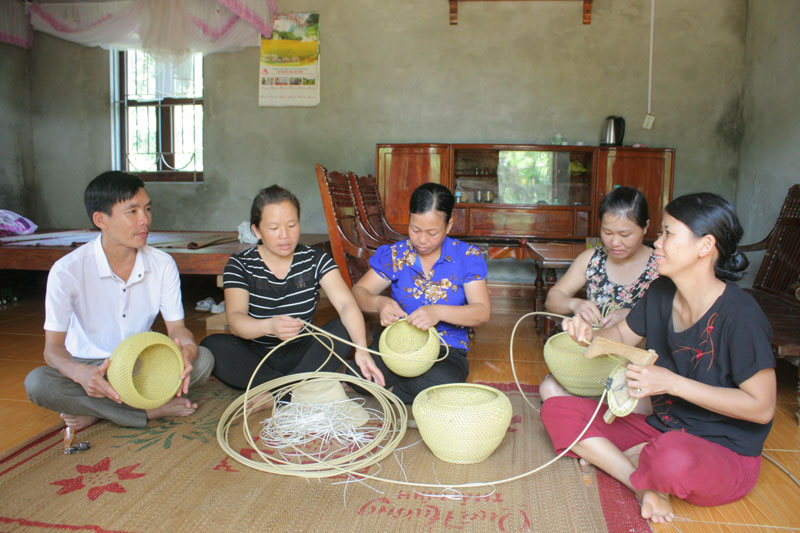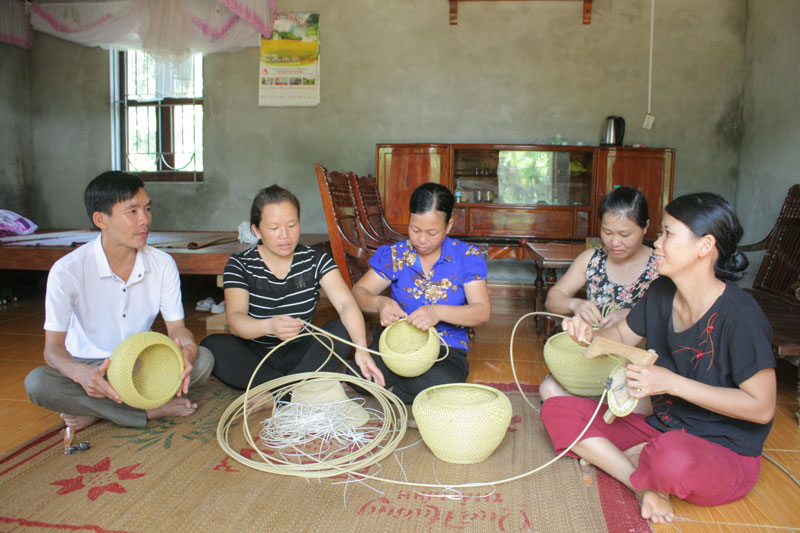
(HBO) – It seems that almost of the local people in Doan Ket residential area, Da Bac town know Ms. Dinh Thi Khanh. Since April 2018, she was mobilized to become the Party Secretary of Tien Phong commune Party Committee - one of the disadvantaged communes of Da Bac upland district. Many people know her not only in her work position but also as a person of merit in bringing down the rattan and bamboo knitting in the lowland to the mountainous district with many difficulties.

The people in Doan Ket, Bo residential area,
Da Bac town (Da Bac) develop rattan and bamboo weaving, contributing to
increase their income.
Mr. Dinh Cong Quang, the Vice Chairman of Da
Bac Farmers' Association, said: The income of 2 million VND may be low for many
people, but for rural women, that is quite high. Particularly in Da Bac town,
the area of agricultural land is small, the service is not developed. Each
household has an average of only 1,000-2,000 square meters of rice, vegetables,
and maize, that can not remain daily life or economic development.
The employment problems for rural people have
long been a problem for the town. The introduction of rattan, bamboo knitting
here is important to help the local people have more jobs and increase their
income. At present, the jobs of bamboo and rattan knitting have grown in the
Doan Ket residential area with 20 households, 15 participating households of Bo
residential area.
Talking to Ms. Dinh Thi Khanh, the Party
Secretary of Tien Phong commune said that: formerly, while working at the District
Education and Training Center, she saw Luong Son district had rattan and bamboo
knitting jobs to create many jobs for laborers. She felt very happy. She and
her husband's sister-in-law went to Phu Vinh, Phu Nghia, Truc Son communes (in
Hanoi) to study. After connecting with the product chains, she used her money
to open classes and hire people in Phu Vinh commune to teach her citizens. In
addition, while working in the Center for Education and Training of the
district, she combined to open 3 vocational training classes, including one for
30 Doi hamlet learners in Hien Luong commune; 1 class of 30 learners in Phu
village, Toan Son commune and 1 class for 20 people with disabilities in the
whole district. Later on, the rattan and bamboo weaving is gradually expanded
to the communes of Hien Luong, Tu Ly, Toan Son and Da Bac town. In order to
have a clue for her exchange of products, Ms. Khanh linked up to establish Tuan
Dat Agricultural Trade Service Cooperative by Mr. Dinh Van Hoang as the
Director. The local people can come directly to the Cooperative to get
materials for home and bring back products to there.
According to data from the Hoa Binh Provincial Party Committee, the industrial production index for the first six months of 2025 is estimated to have increased by 20% compared to the same period last year. This marks the highest year-on-year growth rate for this period since 2020.
In the first six months of 2025, Hoa Binh province’s export turnover was estimated at 1.145 billion USD, marking an 18.11% increase compared to the same period in 2024. Import turnover was estimated at $ 804 million, a 17.15% increase, which helped the province maintain a positive trade balance.
The lives of the ethnic minority farmers in Tan Lac district have gradually improved thanks to the new directions in agricultural production. This is a testament to the collective strength fostered through the professional associations and groups implemented by various levels of the district’s Farmers’ Union.
With the motto the "product quality comes first,” after nearly one year of establishment and operation, Muong village’s Clean Food Agricultural and Commercial Cooperative, located in Cau Hamlet, Hung Son Commune (Kim Boi district), has launched reputable, high-quality agricultural products to the market that are well-received by consumers. The products such as Muong village’s pork sausage, salt-cured chicken, and salt-cured pork hocks have gradually carved out a place in the market and they are on the path to obtaining the OCOP certification.
In the past, the phrase "bumper harvest, rock-bottom prices" was a familiar refrain for Vietnamese farmers engaged in fragmented, small-scale agriculture. But today, a new spirit is emerging across rural areas of Hoa Binh province - one of collaboration, organisation, and collective economic models that provide a stable foundation for production.
Maintaining growing area codes and packing facility codes in accordance with regulations is a mandatory requirement for agricultural products to be eligible for export. Recently, the Department of Agriculture and Environment of Hoa Binh province has intensified technical supervision of designated farming areas and packing facilities to safeguard the "green passport" that enables its products to access international markets.



